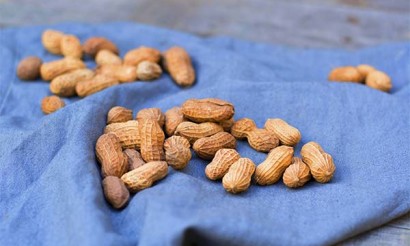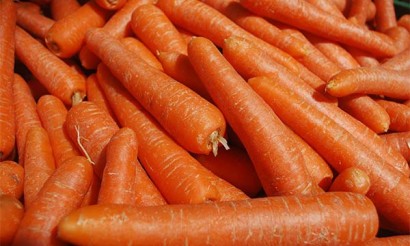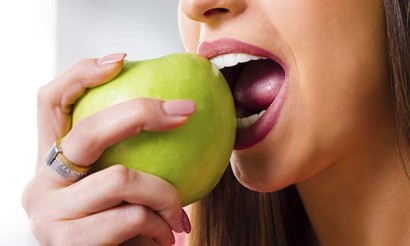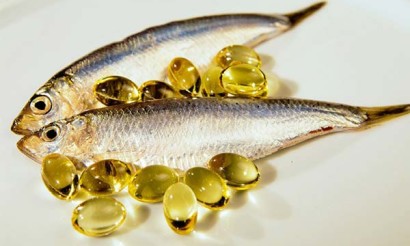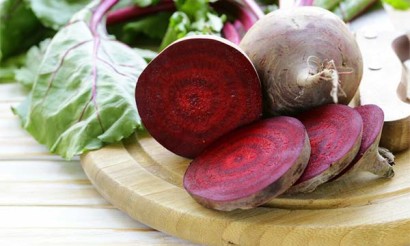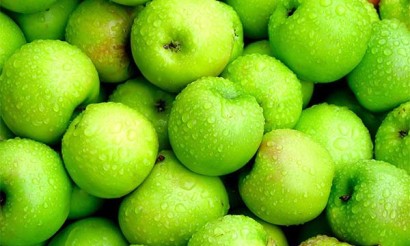Dried apricots during breastfeeding: the benefits and harms
apricot is a dried apricot without a seed, is a delicious, useful and nutritious dried fruit.
- Can I eat apricots when breastfeeding
- First month
- In the second month
- How to eat dried apricots correctly
- How much can I eat per day
- May I eat them at bedtime and on an empty stomach?
- Do I wash them before eating?
- The benefits of dried apricots when breastfeeding
- Is dried apricot compote useful during breastfeeding?
- What are dried apricots dangerous for lactation?
- How to choose dried apricots without chemicals
- How to correctly introduce dried apricots into a nursing mother's diet
- How to dry dried apricots at home
- Dish from dried apricots for a nursing mother
- Salad with dried apricots and chicken
- Oatmeal with dried apricots
- Cheesecakes
Can we eat dried apricots while breastfeeding?
In the recommendations on the diet of a nursing mother, apricots are included in the list of allowed products. But here there is a number of nuances.
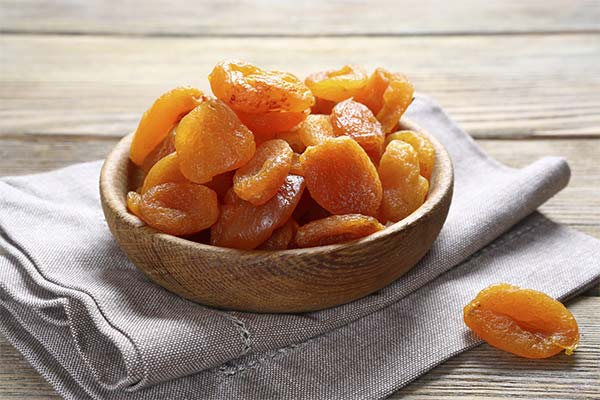
- First, it is best to include apricots in the menu when the child is three months old.
- Secondly, you should start with small portions. It is better to give preference to compote or decoction based on apricots - this is ideal for the first time.
- Thirdly, you must be sure of the quality of bought apricots: it should not contain any chemical elements, be without stains or a glossy sheen.
In the first month
apricots are one of the most popular types of dried fruit. However, for the gastrointestinal tract of a one-month-old baby, even a low concentration of nutrients from this product in milk can be a heavy burden. This may be the cause of an allergic reaction or provoke colic. It should not be forgotten that the condition of the baby depends directly on the well-being and diet of the mother, who in the first months of life is extremely sensitive to even the slightest changes.
In the second month
As for the period of two months after birth, here, too, you should not add too much apricots to your diet. It is recommended to occasionally allow yourself a few pieces a day, so as not to cause any problems for the baby. Experts advise to wait until the baby is three months old. Starting from this period, the mother's diet can become more varied. This rule also applies to the consumption of apricots.
However, you should always remember that too much of even the most useful and natural product can have a negative impact on the quality of milk. And this will inevitably cause problems with the digestive system and the well-being of the infant. Do not neglect the recommendations of experts. Sticking to the list of allowed products, you can avoid many unpleasant consequences, ensuring yourself and your baby excellent health and comfortable digestion.
How to consume dried apricots
Gooseberries can be consumed not only as a separate product, but also as part of a dish. It is excellent for baking, making salads, desserts and even recipes with meat. In any case, quality apricots in moderate portions are good for your health.
How much you can eat per day
If we are talking about a portion of apricots for a nursing mother, it is 300 g per week. It is necessary to divide this amount into small portions, distributing them into several meals for 7 days.
One serving should not exceed 100 grams (apricots contain a fairly large amount of sugar, which may adversely affect the quality of breast milk, provoking a baby rash, stool problems or abdominal pain).
Can I eat at night and on an empty stomach
It is not forbidden to eat apricots on an empty stomach. But you should remember that it has a mildly laxative effect. If there is a problem with the intestines, then apricots will be an excellent solution. Before using it, it should be soaked in boiling water and left to insist overnight. The next morning, it is recommended not only to eat apricots, but also to drink the infusion. It is good for the digestive system and is guaranteed to help get rid of many problems.
It is categorically not recommended to eat apricots after eating fatty foods. It will adversely affect the digestion process and may cause fermentation and discomfort.
Dried fruits are allowed to eat in the evening. They perfectly satisfy the hunger, and also contain a lot of useful vitamins and trace elements. However, it is recommended to eat apricots no later than two hours before bedtime, so that they have time to digest. The best solution is to eat the treat in the first half of the day.
Do I have to wash them before eating them?
Before using apricots, as well as other dried fruits, it is recommended to wash thoroughly. The best way is to scald it with boiling water and leave it for 15-20 minutes. This will not only wash away dirt and germs, but also make this product much softer and juicier, improving its taste. Even if apricots were purchased in the store and stored in an airtight package, you should not neglect this rule.
The benefits of apricots during breastfeeding
With the regular inclusion of apricots in the diet, you can solve a number of problems related to the work of the digestive system. This product has a beneficial effect on the state of health of a person who has various kidney or heart diseases. This variety of dried fruits can overcome the problem associated with high blood pressure, thanks to the useful trace elements that contribute to the removal of excess moisture from the body and strengthen the walls of blood vessels.
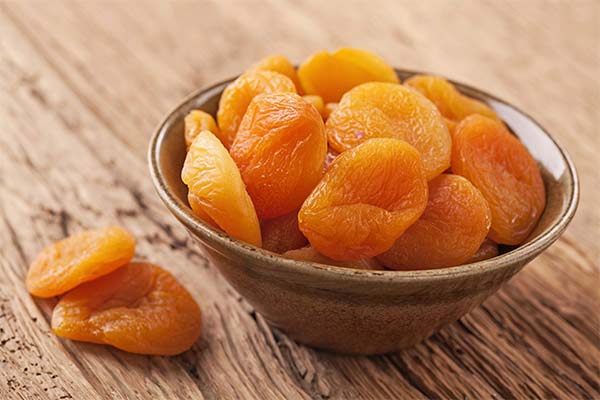
In addition, apricots are able to increase the body's defenses, strengthening the immune system of a nursing mother. This dried fruit is an excellent addition to the diet, which is able to provide a norm of some vitamins and trace elements (only 30 g of apricots a day is enough). It contains vitamins A, B, PP, K and D. Of useful trace elements we can highlight such as iron, calcium, manganese, copper and potassium.
apricots are the product that helps to stabilize the nervous system of a nursing mother. It has a positive effect on the level of cholesterol in the blood, is able to prevent the baby from colic.
In addition, another plus of apricots is that this dried fruit helps to remove excess fluid from the body and relieve edema.
A dried apricot is rich in glucose and fructose, it will help a nursing mother to reduce the need to consume bakery and confectionery products. It is a great alternative, which is both delicious and absolutely safe for the health of the mother and her baby. It does not contain any preservatives or artificial flavor enhancers, which is very important for the breastfeeding period.
Is dried apricot compote useful during breastfeeding?
Compote from apricots is considered a useful drink during breastfeeding. It contains the same useful vitamins and trace elements as the apricots themselves, only in a smaller concentration. An excellent solution will be to introduce dried fruit into your diet in this way. This will avoid allergic reactions and will not harm the child's health.
Later, when the baby is ten months, allowed to offer him a compote based on apricots. If the baby is prone to allergic reactions, it does not hurt to have a preliminary consultation with your pediatrician.
How to prepare a dried apricots compote for a nursing mother
Dried fruits are considered to be allergens, as they contain a fairly large amount of sugar. That is why experts do not recommend including this product in your diet in the first two months of life of the child.
The best solution for breastfeeding is to make a compote from those apricots that have been dried yourself. It is easy enough to do. This method has a huge advantage, as there will be absolute confidence in the quality and safety of the finished product. The fact is that store-bought dried fruits are very often treated with various chemicals in order to extend their shelf life and preserve their perfect appearance. In addition, some sellers can add honey or sugar syrup, which significantly increases the amount of sugar in the product. And this can adversely affect the quality of breast milk, leading to digestive problems in the baby.
Compote from apricots is prepared quite simply and quickly. This variety of dried fruit has quite a sufficient amount of natural sugar. If it does not taste good enough to make compote, you can add a little honey or sugar.
To make the compote you will need the following ingredients:
- 2 liters of water;
- 250 grams of apricots;
- Sugar or honey (to taste).
First, you need to soak the apricots in hot water. This rule applies to almost all categories of dried fruit, as it allows you to qualitatively wash this product and prepare it for further cooking. After 15 minutes, pour out this water (you do not need it to make compote). Then pour water on apricots and put on the fire. You should not cook such a compote for too long, as apricots can fall apart. It is sufficient to bring it to a boil and let it stand for a couple of hours.
You can add other ingredients to dried apricots, this will give the compote an unusual and pleasant taste. Excellent combines this type of dried fruit with apples.
To make this version of the compote you will need the following ingredients:
- 3 liters of water;
- 4 apples (medium size);
- 10-12 pieces of apricots;
- sugar or honey (to taste).
Pre-soak apricots in boiling water for 15-20 minutes. After this water pour out, as in the previous recipe. The apples cut into slices. Pour 3 liters of water into a saucepan, put chopped apples and prepared apricots in it. Once the water begins to boil, add honey or sugar. Such a compote to boil for 5 minutes, after which it is recommended to let it infuse for several hours (this will improve its taste).
Another variant of the recipe for compote for breastfeeding mother contains in its basis four ingredients: apples, apricots, prunes and raisins.
For its preparation you will need:
- 100 g prunes;
- 100 gr of apricots;
- 50 g of raisins;
- 3 apples of medium size.
If the compote seems too boring, you can add a little sugar or honey to it. Prunes and apricots should be poured steep boiling water and leave to stand for 15 minutes. During this time, prepare the apples for the compote by cutting them into cubes or slices. Next, put all the ingredients necessary for cooking compote in a saucepan, and then pour 2 liters of water over them. Bring the mixture to a boil, and then immediately turn off. Before using the compote, let it infuse for two to three hours. So it will get a darker shade and become more fragrant.
Such a compote will be a wonderful addition to the menu of a nursing mother. It is rich in useful vitamins and trace elements. In addition, the concentration of nutrients in it is not so great as to cause the baby any unpleasant consequences in health or digestion.
What are the dangers of dried apricots during lactation?

Like any other dried fruits, apricots contain a fairly large amount of sugar. This is what can negatively affect the quality of breast milk. Infants are very sensitive to any changes, so a nursing mother should adhere to the recommendations given by experts. It should not be included in the diet until the baby is three months old. Supplement the menu with apricots should be gradually, starting with the smallest portions.
How to choose apricots without chemicals
A dried apricot is considered a safe and allowed during breastfeeding. But do not forget that you should not exceed the recommended portion, which is 100 g per day (no more than three times a week).
However, it is strictly forbidden to use apricots, which cause any doubts. These may include the following signs:
- Too bright and unnatural color (high probability of adding artificial dyes).
- Strong sheen (natural apricots should be matte in appearance).
- The presence of preservatives in the composition (highly not recommended for breastfeeding).
- Too pronounced smell (possibly the addition of flavorings, as natural apricots have a barely perceptible flavor).
Do not forget that if the origin of the product was not completely natural and there are any preservatives in the composition, it can have a negative impact on the health of the baby. Part of the chemicals may be transmitted to the baby with the mother's milk, which will inevitably cause a number of unpleasant problems with digestion.
Buying a small bag of apricots in the store or at the market, most people do not pay attention to the information that is placed on the package. And this is a big mistake. If the composition indicates sulfur dioxide (also called E220), then it is hardly possible to call such a product natural and absolutely safe for a nursing mother. The presence of any other components indicates that the drying method was not natural. The fact is that on an industrial scale apricots and other fruits are dried in special ovens through treatment with sulfur dioxide gas. In this way, the finished product retains its ideal appearance and color much longer. In addition, such treatment avoids spoilage of products by insects. Manufacturers are interested in ensuring that their products were safe for the health of buyers. As for the nursing mother, here dried in this way apricots are categorically not suitable for nutrition.
It is best to buy dried fruits in specialized small stores, where the chance to buy a high-quality and useful product is much higher. Naturally dried apricots look less attractive than the one sold in a beautiful branded package. But you should not be fooled by external appeal, because it is not the most important criterion in the choice of food products.
Fact! Naturally dried apricots look less presentable, but they are much more healthy. And most importantly - it is absolutely safe both for the health of a nursing mother and for her baby.
How to introduce dried apricots into the diet of a nursing mother
It is generally accepted that dried fruit for a nursing mother is allowed to introduce in her own diet, starting from the third month of lactation. It is recommended to eat a few pieces of it in the first half of the day. After that, the right decision is to observe the child's behavior, to make sure that it has not had a negative impact on his digestion and well-being. If all is calm and well, then after two days you can slightly increase the portion. This method is considered the most appropriate, the occurrence of any problems is extremely unlikely.
But if a woman has had any allergic reaction to peaches and apricots before birth, there is a high probability that it was passed on to the baby. Here it is better to completely eliminate these products from your diet, to be sure to avoid negative consequences.
How to dry apricots at home
One option is to dry apricots for the winter in an electric dryer. This household appliance greatly accelerates the process of drying fruits, making it elementary and of high quality. Equipped with a fan and a powerful heating element provides a perfect result.
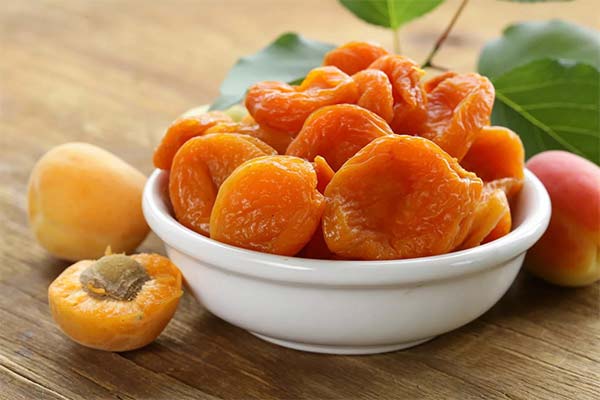
Making apricots in an electric dryer at home is as follows:
- Apricots are divided into halves, removing the pips.
- Wait until the excess moisture drains from them.
- Apricot halves laid out on the trays of an electric dryer, keeping a small distance between them (so they do not stick together).
- The first 2 hours dry at 50 degrees.
- For the next 6 hours the temperature is set to 60 degrees.
- For the remaining 2 hours, the figure is lowered to 50 degrees.
After all the steps are done, take the dried apricots out of the dryer and let them cool. It is better to let it stand for 24 hours, so that all excess moisture is completely gone. Then dried apricots should be put in a glass container (it should be tightly closed, otherwise insects or mold can appear).
The apricots can be dried in an ordinary oven, which is available to every housewife. Preliminary it is recommended to dry halves of apricots at room temperature for 3-4 hours (it is better to remove excess moisture before proceeding to heat treatment). Line a baking tray with parchment, then put halves of apricots on it so that they do not touch each other. The temperature should not exceed 60 degrees. It is necessary to open the oven slightly to avoid burning. Also, to achieve the best quality of apricots and their even drying it is necessary to periodically turn apricot slices. You should carefully monitor the condition of the future apricots, as they may dry out and become unpalatable if they are overcooked. To ensure perfect results, after cooking the apricots to stand a few more hours at room temperature (this will ensure the complete evaporation of excess moisture). It is very important not to skip this step, otherwise the apricots may begin to spoil in storage.
The easiest way is to dry in the open sun. This option is ideal for owners of a private house or dacha. All that is needed is to take the apricot slices out into the sun, laying them out on some hard surface. This method is considered the best. The halves of apricot fruits are laid out on a cloth or wooden lattice in an area where there is the maximum amount of sunlight and no shade from trees. It is very important that there is air circulation: do not cover the sliced apricot slices with anything on top. On average, it takes 5-6 days to get a perfect result and complete drying of apricots. At night it should be brought indoors, as the fallen dew will have a negative impact on the final result - it can affect the color and taste not in the best way. The same applies to rainy weather, so the apricots must be protected from exposure to any moisture.
You can string halves of apricots on a rope and dry them in a hanging state. But here you should not forget that they must be periodically turned, otherwise the result may be uneven. This method requires a little more time, the drying process takes 2 to 3 weeks. However, dried apricots, dried in this way, are stored a little longer, while absolutely completely preserving all its useful properties.
Dishes with apricots for a nursing mother
It is usually customary to use apricots in the raw version or as a base for making compote. However, there are still a lot of different delicious and useful ways to use this product. A dried apricot can be an excellent basis for cooking a variety of dishes.
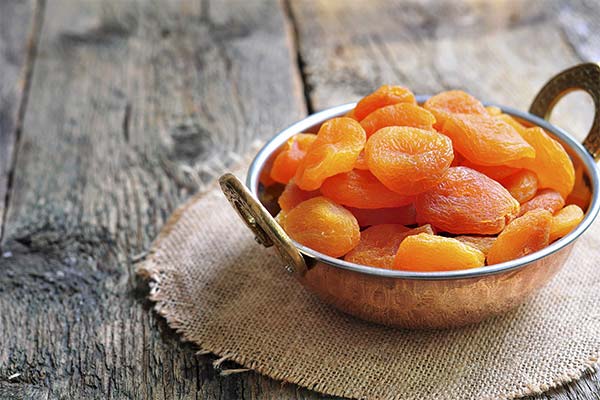
Salad with apricots and chicken
One such unusual recipe is a salad with apricots and chicken. It is very healthy and very nourishing. The combination of proteins and micronutrients makes this dish an excellent option for a dietary dinner. To prepare this salad you will need the following ingredients:
- 400 g chicken (breast);
- 1 green apple (large);
- 100g of dried apricots.
The chicken fillet should be boiled until tender, then cooled and cut into small pieces. Peel the apple and grate it on a coarse grater. Pre-soak the dried fruit in steep boiling water, leaving it to soak for 15 minutes. After that, take out the apricots, dry and cut into small pieces. Next, combine the ingredients, dressed with a salad or natural yogurt.
Oatmeal with dried apricots
An excellent option for breakfast can be oatmeal with pieces of dried apricots. For its preparation you will need:
- 100 g of oatmeal;
- 300 ml of water;
- 60 g of dried apricots;
- 10 g of butter;
- 70 ml of milk.
Before cooking, it is recommended to rinse the grits and apricots under running water. Next, put the ingredients into a pot and pour boiling water. Cook the porridge over low heat to avoid burning. At the end, add milk and butter, if desired, a little sugar and salt.
Cheesecakes
As a delicious and healthy afternoon snack, you can prepare cheesecakes with pieces of apricots. This dried fruit is a great alternative to sweets, which also has a lot of useful properties, which has a beneficial effect on the health of a nursing mother.
To make the cheesecakes you will need the following ingredients:
- 250 g of cottage cheese;
- 1 chicken egg;
- 1 tbsp. sugar;
- 1 tbsp. semolina;
- 3 tablespoons of wheat flour;
- 50 g of dried apricots;
- A pinch of salt.
You need to knead the cottage cheese, add sugar and egg. Mix the mixture thoroughly. After adding semolina and salt, leaving the base to stand for 15 minutes. Pre-soaked in boiling water, cut apricots into small cubes, dry them from moisture and put them in the resulting curd mass.
Next, form the cheesecakes: you should not make them too dense, so they may not fry inside to the end (and also burn on the outside). Before frying, coat the cheesecakes in flour. Cook on low heat, covering the pan with a lid.
Consumption of apricots should start with small portions. It is best to introduce it into your diet gradually, starting with compote. After a couple of days, you can try to eat a couple of pieces (no more than 4-5). If there are no unpleasant changes in the child's behavior (allergic reactions, rash or colic), you can gradually increase the portion of apricots in your menu. But do not overdo it: no more than 100 grams at a time and no more than 3 days a week. Simple and useful recipes based on apricots can make the menu of a nursing mother more diverse, balancing the diet and ensuring the intake of essential vitamins and trace elements.
«Important: All information on this site is provided solely for introductory purposes only. Consult with your health care professional before using any recommendations. specialist before applying any of the recommendations. Neither the editors nor the authors shall be liable for any possible harm caused by materials."

